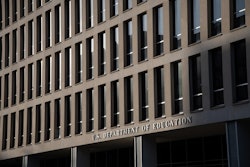The Department of Education announced Thursday that all colleges and universities  Education Secretary Linda McMahon
Education Secretary Linda McMahon
Education Secretary Linda McMahon directed the National Center for Education Statistics to expand its data collection requirements through the Integrated Postsecondary Education Data System, which already tracks enrollment and financial information from more than 6,000 institutions nationwide.
Under the new mandate, universities must report race-disaggregated data on their applicant pools, admitted students, and enrolled cohorts at both undergraduate and graduate levels. The reports must include standardized test scores, GPAs, and other academic metrics organized by demographic categories.
"We will not allow institutions to blight the dreams of students by presuming that their skin color matters more than their hard work and accomplishments," McMahon said in a statement announcing the directive.
The change implements President Trump's January memorandum calling for transparency in college admissions following the Supreme Court's 2023 decision in Students for Fair Admissions v. Harvard, which ruled that race-conscious admissions violate federal civil rights law.
Previously, the federal data system required only enrollment numbers by race, not application or admission statistics. The expanded reporting will enable government oversight of whether schools are complying with the affirmative action ban.
Universities have until the next IPEDS reporting cycle to implement the new data collection, typically due each fall. Non-compliance could jeopardize institutions' eligibility for federal student aid programs, which processed $120 billion in loans and grants last academic year.
Higher education groups expressed concerns about the administrative burden and potential legal implications of the enhanced scrutiny.
Legal experts say the data could provide evidence for future discrimination investigations or lawsuits against universities.
The Supreme Court's Harvard decision affected admissions practices nationwide, with many selective universities reporting changes to their application processes and admitted student demographics in the months following the ruling.
Some institutions have shifted toward socioeconomic-based preferences or eliminated standardized testing requirements, strategies that can maintain diverse enrollment without explicitly considering race.
The Education Department said it will develop audit procedures to verify data accuracy across institutions, though specific enforcement mechanisms remain unclear.
The directive applies to all colleges and universities participating in federal student aid programs, covering virtually every major higher education institution in the United States.















